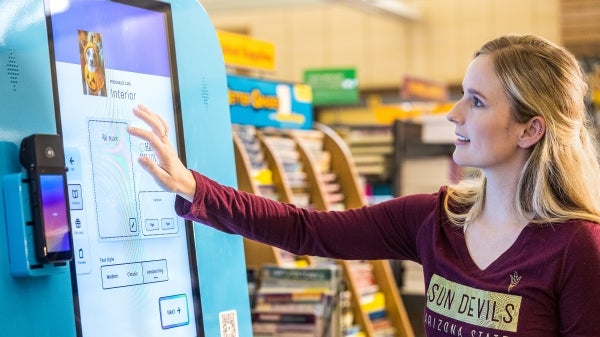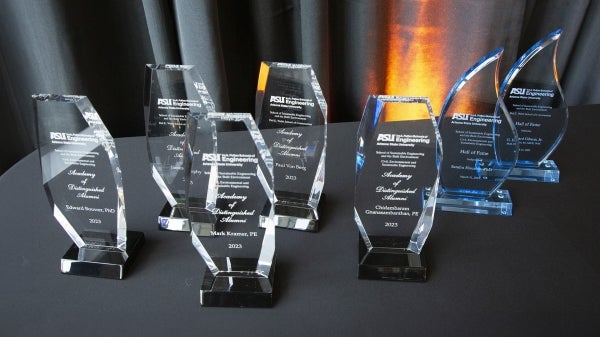Thunderbird team wins international business ethics case competition

The winning Thunderbird team.
While cynics may say that business ethics is an oxymoron, it’s alive and well at ASU's Thunderbird School. Case in point: A team of five T-birds bested such b-school heavyweights as the University of St. Thomas, the University of Oxford-Saïd School of Business and the University of Miami to win top spot in two out of three categories in the 20th International Business Ethics Case Competition (IBECC) held April 20-22, in Cambridge, Massachusetts.
In true Thunderbird fashion, the winning quintet included two Indian students (Vyoma Mehra and Gaurav Shetty), one Hungarian (Zoltan Nagy), one Australian (Christopher White) and one American (Kimberly Hergenrader). All five are Master of Global Management candidates who began their programs in spring of this year. This was their first case competition — and the first time Thunderbird took part in the IBECC. The Lincoln Center for Applied Ethics at Arizona State University, which is headed by T-bird David C. Lincoln and family, funded the team’s participation.
The IBECC, which is jointly sponsored by the Center for Ethics and Business at Loyola Marymount University, the Opus College of Business of the University of St. Thomas, the Center for Business Ethics at Bentley University and the Ethics & Compliance Initiative, asked teams of graduate and undergraduate business students to prepare three presentations on a business-ethics case of their choosing: a 25-minute presentation, a 10-minute presentation and a 90-second presentation.
Thunderbird’s team won both the 10-minute and 90-second rounds for their presentations on the 2015 privacy vs. protection dilemma Apple faced when asked by the U.S. Federal Bureau of Investigation to provide back-door access to the iPhones used by San Bernardino shooting assailants Tashfeen Malik and Syed Rizwan Farook.
“The ethical issue Apple faced was that to open access like this to the U.S. government would set a legal precedent that would have to be followed when any country’s government made a similar demand,” explained Mehra, the team’s lead. “Our stance was that Apple had a responsibility to both itself and the worldwide internet community to refuse this request because it could not risk being forced to comply with future governmental requests that might not be ethically motivated.”
The team had three months to prepare its position and presentations. Melissa Samuelson, clinical professor at Arizona State University’s W. P. Carey School of Business and former clinical professor of ethics at Thunderbird, acted as faculty coach and mentor.
“The Thunderbird team picked a case that was not only relevant for a major multinational company based in the US, but they were able to show and draw connections to global privacy and security issues in the technology industry,” said Samuelson. “This kind of analysis and understanding of global issues set this team above their peers. They approached the dilemma as if they were truly consulting with Apple on the most ethical response — not just preparing for a competition.”
That consultant mentality, however, got the team into a bit of a quandary when they chose to approach their 25-minute presentation (which was delivered first) as if the judges knew the ins and outs of the Apple situation and needed little background to follow the team’s position. They learned afterward that wasn’t the case.
“After the 25-minute round, we basically changed our presentation approach overnight and delivered the 10-minute and 90-second speeches from a more layman perspective,” Mehra said. The team also adjusted their speaker roles for the following two presentations after learning that the judges were challenged by all of their varying accents.
“At Thunderbird we hear different accents all the time so it isn’t unusual for us. We adjusted our approach so we would not have that problem again,” Mehra said.
Accent issues aside, the global nature of the Thunderbird team had extraordinary benefits.
“Our diversity allowed us to bring a global perspective that other teams could not,” said Mehra. “The cultures represented in our group — and the international dimension that added — brought so much to our discussions and our solution.”
How did the team propose Apple handle issues of this nature moving forward? Create a detailed, hacker-proof process by which the Apple organization can access iPhone data stored on iCloud (which, for legal purposes, belongs to Apple) — rather than a process for accessing data stored on the phone itself (which belongs to the individual). By doing so, Apple can share its own data without overstepping its ethical bounds.
As the first business school to adopt a professional Oath of Honor pledging commitment to ethical business practices, ethics is a fundamental pillar of the Thunderbird experience. These students are a perfect example of that.
“The IBECC was an amazing experience,” said Mehra. “We look forward to participating again next year — and bringing an undergraduate Thunderbird team with us.”
More Business and entrepreneurship

ASU alum's personalized greeting card kiosk debuts on Tempe campus
Everyone knows how disheartening it is to dash into a store to grab a last-minute holiday card and find the selection picked over…

Celebrating industry giants and distinguished alumni
Four outstanding alumni and two industry leaders will be honored at the School of Sustainable Engineering and the Built…

ASU bachelor's degrees in business step up in rankings
The W. P. Carey School of Business at Arizona State University made strides in several areas in the new U.S. News &…